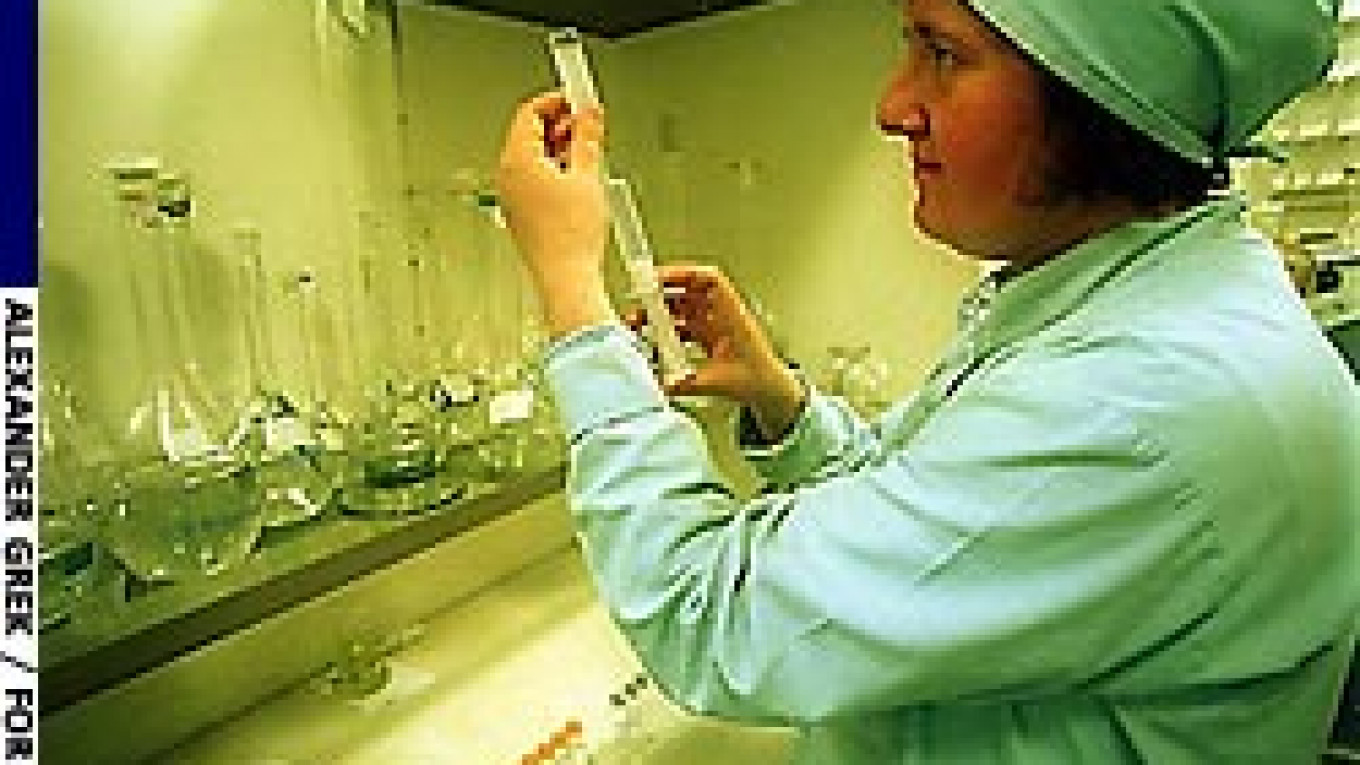Regional administrations picked up the slack in distributing insulin to Russia?€™s 8 million diabetes sufferers without so much as a ruble from the federal budget and turned to domestic producers for cost-cutting solutions.
Under the Soviet Union, the Health Ministry controlled every aspect of insulin distribution. It purchased insulin from manufacturers, and then, based on data provided by regional doctors, supplied the entire country.
Starting in 1996, the federal government began to hand over responsibility for buying insulin to the regions.
"The change gave Russian insulin makers a very good opportunity to expand their markets," said Lydia Davydova, the coordinator for the Russian Diabetic Association, a public organization promoting the right to high-quality free insulin. She said domestic manufacturers have found it easier to make deals with regional administrators than with better-financed ministry officials.
Domestic production lost its footing in 1987 when the Health Ministry denied certification to insulin manufactured by the Kurgan Pharmaceutical Plant in western Siberia. To secure a better product, the ministry imported the bulk of insulin from Danish Novo Nordisk, American Eli Lilly and German Aventis.
However, in the early ?€™90s the ministry begin to arrange tenders for insulin contracts, and Russian companies got a chance to showcase improvements in production.
Bryntsalov-A in Moscow, for one, produces insulin of equal, if not higher, quality than that made by Novo Nordisk, Davydova says. Bryntsalov manufactures a product made from insulin isolated from pigs by the French company Diosint.
Bryntsalov was the first domestic company to attract the attention of regional authorities with its aggressive market strategy.
"This year we have already won back the Moscow, Tula and Penza regions [not including the capital cities] and now they are buying our insulin almost exclusively," said Marina Ivanova, Bryntsalov?€™s general manager.
Insulin is usually produced in vials or cartridges. Vials are attached to a syringe and cartridges are used with an easily transportable pen-shaped injector.
Ivanova said the price of Bryntsalov?€™s insulin cartridges runs from $14 to $15, while Novo Nordisk?€™s costs almost $17.
Saransk, in the Mordovia region, decided to give Bryntsalov a trial run. The region was hard-pressed to supply the 1,500 people dependent on free insulin.
"We were invited to their [Bryntsalov?€™s] plant to see the complete production process and found it met current standards," said Nina Ruzanova, head of the local diabetic association.
"We decided that 1 million rubles [$36,600] a month would be spent on Bryntsalov insulin, as we decided that it is acceptable, at least for adults [in an initial trial period]."
At the same time, the 1.5 million rubles left over will continue to be used to buy Novo Nordisk insulin.
The capacity of the Bryntsalov plant is about 36 million vials and 54 million cartridges a year. The company declined to say how much insulin it sells.
According to Novo Nordisk?€™s estimates, Bryntsalov?€™s production increased from close to $8 million to $15 million last year. And the head of the Novo Nordisk Moscow office, Harry Itameri, said Bryntsalov will continue to be an active player this year.
"The market becomes more and more competitive," he said, adding that his company holds up to 65 percent of the domestic market.
Novo Nordisk said its Russian operation imported $46 million worth of insulin in 1999, Eli Lilly $21.2 million and Aventis $6.2 million.
Growing domestic manufacturer Moscow Endocrine Plant produced animal insulin worth $2 million last year, according to Novo Nordisk?€™s estimates.
Endocrine?€™s insulin is manufactured from substances supplied by the Czech company SPOFA, and the plant?€™s capacity is 12 million vials a year.
"Recently, we produced 380,000 vials, and 100,000 of them have already been sold in Tomsk, Krasnoyarsk and Perm," said Yevgeny Sharokhin, Endocrine?€™s director. "It is just the first step."
Meanwhile, the Bioorganicheskaya Khimiya Institute is exploring the possibility of producing genetic insulin. Preferred already for use with many types of diabetics, including pregnant women, genetic insulin is expected to eventually replace animal insulin, according to the American Diabetics Association.
"We have just finished a clinical examination of our genetic insulin," said Anatoly Shirotnikov, institute deputy director. "By the end of the year, we will finish all the necessary paperwork."
Shirotnikov said the institute plans to run production in a plant located in Obolensk, 60 kilometers from Moscow. The plant?€™s capacity is expected to be 500,000 vials a year. The institute can produce on its own premises more than 300,000 vials annually, pending an investment agreement with the Moscow city government.
Foreign companies say they are not frightened by the gains in domestic production. The marketing manager for Eli Lilly, Irina Merkulova, said domestic companies like Bryntsalov can only count on cash-strapped regions while Eli Lilly "remains a leader."
Davydova says only time will tell how far the Russian manufacturers will go. "The important question is whether they will be able to maintain a high quality product for a long time," she said. "Companies such as Eli Lilly or Novo Nordisk invest lots of money in quality and modernization. Will the Russian manufacturers be able to do so?"
A Message from The Moscow Times:
Dear readers,
We are facing unprecedented challenges. Russia's Prosecutor General's Office has designated The Moscow Times as an "undesirable" organization, criminalizing our work and putting our staff at risk of prosecution. This follows our earlier unjust labeling as a "foreign agent."
These actions are direct attempts to silence independent journalism in Russia. The authorities claim our work "discredits the decisions of the Russian leadership." We see things differently: we strive to provide accurate, unbiased reporting on Russia.
We, the journalists of The Moscow Times, refuse to be silenced. But to continue our work, we need your help.
Your support, no matter how small, makes a world of difference. If you can, please support us monthly starting from just $2. It's quick to set up, and every contribution makes a significant impact.
By supporting The Moscow Times, you're defending open, independent journalism in the face of repression. Thank you for standing with us.
Remind me later.


